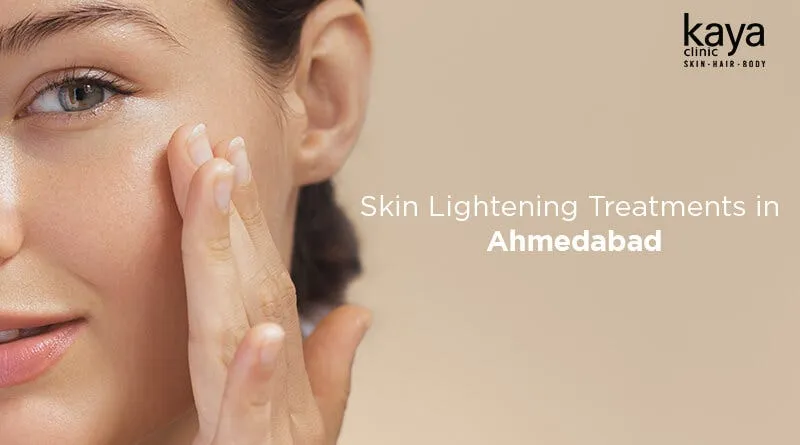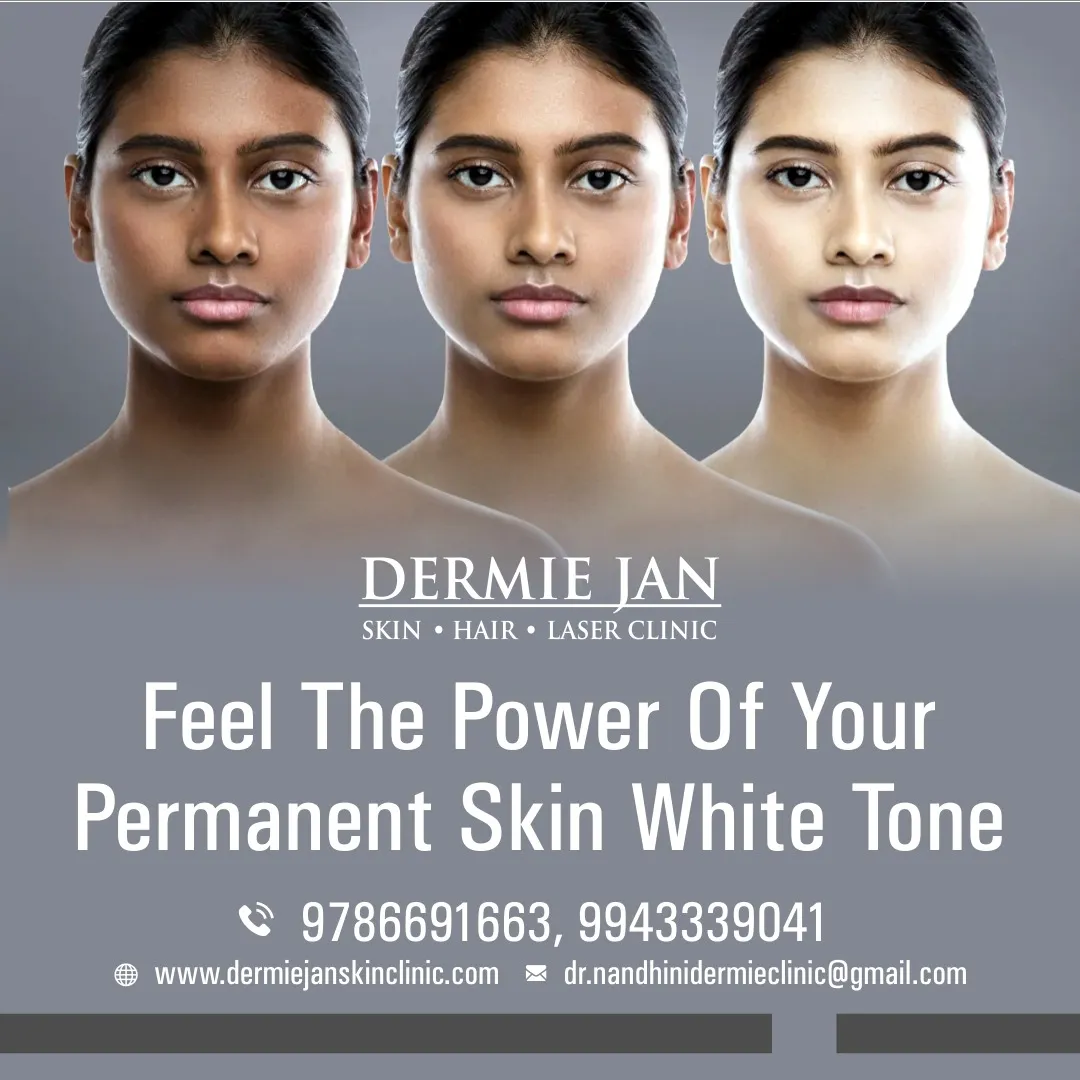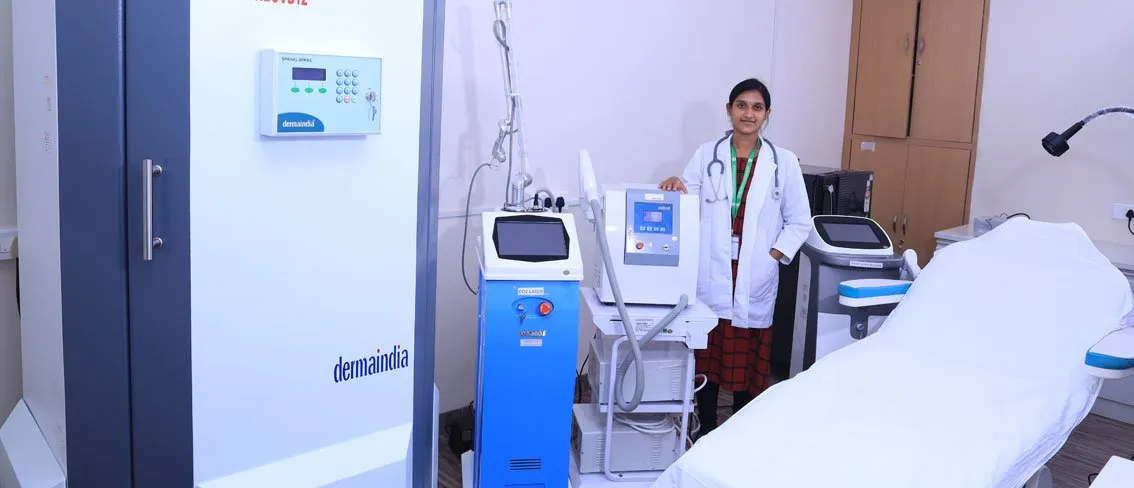Understanding Skin Whitening Treatments
Skin whitening treatments, also known as skin lightening or bleaching, aim to reduce melanin production in the skin, leading to a lighter skin tone. These treatments address various skin concerns such as hyperpigmentation, dark spots, and uneven skin tone. While many treatments promise permanent results, it is important to understand that the longevity of the outcome depends on various factors, including the treatment type, skin type, and adherence to aftercare instructions. Choosing the right treatment requires a consultation with a qualified dermatologist in Coimbatore to determine the most suitable and effective approach for your specific skin type and concerns. The goal is to achieve a brighter and more even complexion, enhancing overall skin health and appearance.
What Causes Skin Discoloration?
Skin discoloration can result from various factors, including sun exposure, hormonal changes, aging, and skin injuries. Overexposure to the sun’s ultraviolet (UV) rays stimulates melanin production, leading to tanning and, in some cases, sunspots or age spots. Hormonal fluctuations, such as those during pregnancy (melasma) or due to birth control pills, can also trigger uneven pigmentation. As we age, the skin’s natural regenerative processes slow down, and the skin can develop age spots and other forms of hyperpigmentation. Skin injuries, such as acne scars or wounds, can also cause post-inflammatory hyperpigmentation (PIH), where the skin darkens in response to the inflammation. Understanding the root cause of discoloration is essential for choosing the correct treatment.
Factors Affecting Skin Tone

Several factors influence an individual’s skin tone, including genetics, ethnicity, sun exposure, and overall health. Genetics play a significant role in determining the amount of melanin your skin produces naturally. People with more melanin tend to have darker skin tones. Sun exposure is a primary driver of skin tone variation, as UV rays stimulate melanin production. Additionally, underlying health conditions, such as certain hormonal imbalances or inflammatory diseases, can affect skin tone and lead to discoloration. Skin care practices and lifestyle choices, including diet and hydration, play a critical role in maintaining healthy skin and an even skin tone. A holistic approach, considering all these factors, is essential for developing an effective skin whitening strategy.
Top 5 Skin Whitening Treatments in Coimbatore
Coimbatore offers various skin whitening treatments, catering to different skin types and concerns. The best option depends on individual needs and the guidance of a dermatologist. This section outlines the top five treatments available in Coimbatore, providing insights into their benefits, processes, and considerations. Always consult with a qualified dermatologist to determine the most appropriate and safe treatment plan for your skin. Each treatment listed has its own set of advantages and potential risks, so professional guidance is crucial. The right choice will depend on factors like your skin type, the severity of the pigmentation, and your overall health.
Chemical Peels in Coimbatore
Chemical peels are a popular treatment for skin whitening, available in various formulations and strengths. In Coimbatore, you can find chemical peels designed to address issues such as hyperpigmentation, acne scars, and uneven skin tone. These peels involve applying a chemical solution to the skin, which exfoliates the outer layers, revealing smoother, brighter skin. The depth of the peel can vary, from superficial to deep, depending on the specific issues being addressed and the desired results. A dermatologist will assess your skin and recommend the most suitable type of peel, considering factors such as skin sensitivity and the extent of pigmentation. Choosing a qualified professional is important for safe and effective treatment.
How Chemical Peels Work

Chemical peels work by exfoliating the skin and stimulating the production of new skin cells. The chemical solution applied to the skin causes controlled damage to the outer layers, triggering the body’s natural healing process. This process encourages the shedding of old, pigmented skin cells and promotes the growth of new, evenly toned skin. The type of chemical used determines the depth of the peel, with lighter peels affecting only the superficial layers and deeper peels penetrating deeper into the skin. Common chemicals include alpha-hydroxy acids (AHAs), beta-hydroxy acids (BHAs), and trichloroacetic acid (TCA). Following a chemical peel, the skin may appear red and sensitive for a short period, but the result is usually a brighter, more youthful complexion.
Benefits of Chemical Peels for Whitening
Chemical peels offer several benefits for skin whitening, including reducing hyperpigmentation, improving skin texture, and diminishing fine lines and wrinkles. By removing the damaged outer layers of the skin, peels can effectively reduce the appearance of dark spots, sunspots, and melasma. They also stimulate collagen production, leading to firmer, more youthful-looking skin. The choice of peel depends on the individual’s skin type, the specific concerns, and the desired results. Peels can be tailored to address specific skin issues, offering a customizable approach to skin whitening. Regular peels, as recommended by a dermatologist, can contribute to long-term skin health and an even complexion.
Laser Skin Whitening in Coimbatore
Laser skin whitening utilizes focused beams of light to target and break down melanin in the skin. This treatment is effective for reducing hyperpigmentation, such as age spots, sunspots, and uneven skin tone. Coimbatore clinics offer various laser technologies, including IPL (Intense Pulsed Light) and fractional lasers, each designed to address different skin concerns. The laser energy is absorbed by the melanin, causing it to fragment and be naturally eliminated by the body. Laser treatments are generally precise and can be customized to suit different skin types and tones. Consulting with a dermatologist in Coimbatore is vital to determine which laser treatment is best suited for your skin and to understand the potential risks and benefits.
Types of Laser Treatments

Various laser treatments are available for skin whitening, each using different technologies and targeting specific skin concerns. IPL (Intense Pulsed Light) is a popular option that delivers a broad spectrum of light to target melanin and reduce pigmentation. Fractional lasers, such as Fraxel, create microscopic injuries in the skin, stimulating collagen production and promoting skin resurfacing. Other lasers, like Q-switched Nd YAG lasers, are particularly effective for treating stubborn pigmentation and tattoos. The choice of laser treatment depends on the individual’s skin type, the depth of pigmentation, and the desired results. A dermatologist will assess your skin and recommend the most appropriate laser technology.
Laser Treatment Benefits and Risks
Laser skin whitening offers several benefits, including effective reduction of hyperpigmentation, improved skin texture, and minimal downtime compared to some other treatments. The precision of laser treatments allows for targeted treatment of specific areas of concern. Risks associated with laser treatments include temporary redness, swelling, and, in rare cases, changes in skin pigmentation (either darkening or lightening). It is essential to choose a qualified and experienced dermatologist in Coimbatore to minimize risks and ensure safe and effective results. Proper aftercare, including sun protection, is vital to maximize the benefits and prevent complications. Understanding the potential risks and benefits is important before undergoing any laser treatment.
Microdermabrasion in Coimbatore
Microdermabrasion is a non-invasive skin resurfacing treatment that exfoliates the skin’s surface. It is a popular choice for improving skin texture, reducing fine lines, and diminishing the appearance of dark spots. In Coimbatore, microdermabrasion is widely available at dermatology clinics and salons. This procedure uses a handheld device to gently remove the outermost layer of dead skin cells, revealing a smoother, brighter complexion. It is a gentle procedure suitable for most skin types, offering noticeable results with minimal downtime. Regular microdermabrasion sessions can help maintain skin health and enhance the effectiveness of topical skincare products.
The Microdermabrasion Process

During a microdermabrasion session, a trained professional uses a handheld device to spray fine crystals onto the skin, gently exfoliating the surface. The device also uses suction to remove the dead skin cells and crystals, leaving the skin feeling smoother and refreshed. The process is typically painless, with some individuals experiencing a mild tingling sensation. The procedure usually takes about 30-60 minutes, and there is minimal downtime. After the treatment, the skin may appear slightly red, but this usually subsides within a few hours. Multiple sessions are often recommended for optimal results, usually spaced a few weeks apart, to maintain skin health and improve overall appearance. A good skin care routine should be performed after treatment.
Microdermabrasion Benefits for Skin
Microdermabrasion offers several benefits for the skin, including improved skin texture, reduced appearance of fine lines and wrinkles, and diminished dark spots. It also helps to unclog pores, reduce acne, and promote collagen production. The exfoliation process removes dead skin cells, allowing skincare products to penetrate more effectively. Microdermabrasion can also improve blood circulation, giving the skin a healthy glow. It is a versatile treatment suitable for various skin types and concerns. Regular microdermabrasion sessions can contribute to a more youthful and radiant complexion. The procedure is an excellent choice for those seeking a gentle, effective skin rejuvenation treatment.
Topical Creams and Serums
Topical creams and serums are essential components of any skin whitening regimen. Numerous products are available in Coimbatore, each containing active ingredients designed to reduce melanin production and brighten the skin. The effectiveness of these products depends on the ingredients and their concentration, as well as the individual’s skin type and concerns. Consulting a dermatologist is advisable to choose the most suitable products and ensure they are safe for your skin. These creams and serums are often used in conjunction with other treatments, such as chemical peels or laser therapy, to enhance results and maintain an even skin tone.
Ingredients to Look For

When choosing topical creams and serums for skin whitening, look for ingredients known to reduce melanin production or promote skin cell turnover. Key ingredients include hydroquinone, kojic acid, arbutin, vitamin C, and retinoids. Hydroquinone is a potent skin-lightening agent but should be used under medical supervision due to potential side effects. Kojic acid and arbutin are natural alternatives that inhibit melanin production. Vitamin C is a powerful antioxidant that brightens the skin and protects against free radical damage. Retinoids, derived from vitamin A, promote skin cell turnover and can improve skin texture. Always follow the instructions and recommendations of a dermatologist.
How to Use Topical Treatments
To maximize the effectiveness of topical skin whitening treatments, it is crucial to use them correctly and consistently. Always follow the instructions provided by your dermatologist or the product manufacturer. Apply the cream or serum to clean, dry skin, usually once or twice a day, as directed. It’s important to use sunscreen with a high SPF during the day, as the skin becomes more sensitive to sunlight when using these products. Combine topical treatments with a healthy lifestyle, including a balanced diet and adequate hydration, to support skin health. Be patient, as it may take several weeks or months to see noticeable results. Consistent use and proper sun protection are essential for achieving the desired outcome.
Maintaining Results and Aftercare
Maintaining the results of skin whitening treatments requires consistent aftercare and adopting healthy skincare habits. This includes protecting your skin from sun exposure, using appropriate skincare products, and following your dermatologist’s recommendations. After a treatment, the skin is often more sensitive and vulnerable to damage. Sunscreen with a high SPF is essential to prevent further pigmentation and protect the skin from UV rays. Regular follow-up appointments with your dermatologist are vital to monitor your progress and adjust your skincare routine as needed. Adopting a consistent and comprehensive skincare routine will help maintain the results and keep your skin looking its best.
Post-Treatment Care Tips

Post-treatment care is critical for maximizing results and preventing complications. Following your dermatologist’s instructions is paramount. Avoid direct sun exposure and wear sunscreen with a high SPF. Use gentle cleansers and moisturizers to soothe and hydrate your skin. Avoid harsh skincare products, such as those containing alcohol or strong exfoliants. If you experience any side effects, such as redness, swelling, or irritation, contact your dermatologist immediately. Avoid picking or scratching your skin. Follow a consistent skincare routine, including cleansing, moisturizing, and sun protection. Proper post-treatment care will help you achieve the desired outcome and maintain healthy, radiant skin.
Lifestyle and Skincare Habits
Adopting a healthy lifestyle and establishing good skincare habits are essential for maintaining an even skin tone and enhancing the results of skin whitening treatments. Eat a balanced diet rich in antioxidants, which can help protect your skin from damage. Drink plenty of water to keep your skin hydrated and healthy. Avoid smoking and excessive alcohol consumption, as these can damage your skin. Develop a consistent skincare routine that includes cleansing, moisturizing, and sun protection. Regularly exfoliate your skin to remove dead skin cells and promote cell turnover. Consider incorporating vitamin supplements, such as vitamin C and E, into your diet, which can support skin health. Consistent effort and commitment to lifestyle habits play a vital role.
